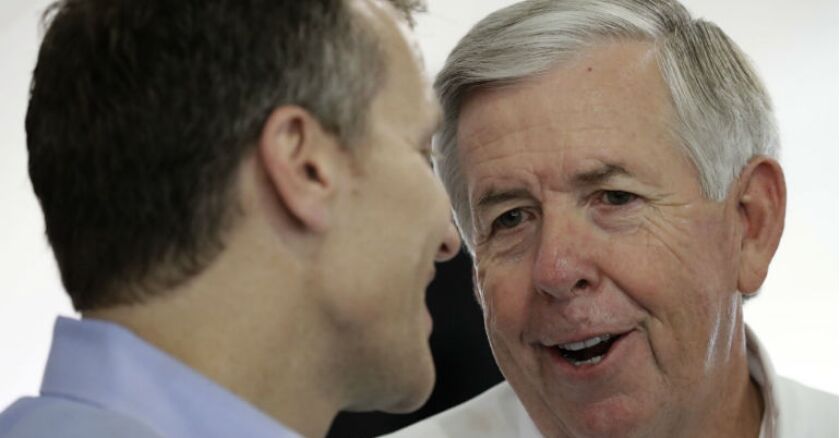Missouri is switching governors. It would be difficult to find a replacement as different from outgoing Gov. Eric Greitens as Mike Parson, the state's lieutenant governor.
Parson is a much more conventional politician than Greitens, a former Navy SEAL who had never held an elected position before and announced his resignation on Tuesday, five months after news broke about a sex and blackmail scandal.
Greitens faced possible impeachment. He left office as part of a plea deal to get criminal charges of illegally obtaining a campaign donor list dismissed, according to the St. Louis prosecutor's office. Earlier on Tuesday, a judge ruled that Greitens and his allies have to comply with a Missouri House subpoena regarding his dark money campaign groups. He could also still be charged with an invasion-of-privacy felony in connection with his extramarital affair.
Greitens was a brash and combative political outsider. His manner of attacking legislators, including fellow Republicans, left him without political cover once he was embroiled in scandal.
Parson, on the other hand, has long been a familiar presence at the Capitol, having served in both legislative chambers.
"One of the contributing factors to the widespread call for Greitens to resign [was] the high level of comfort with having Parson as his successor," says Terry Jones, a political scientist at the University of Missouri-St. Louis.
Parson is sometimes compared with Andy Griffith, the long-ago TV sheriff. In part, that's because Parson served a dozen years as Polk County, Mo., sheriff. But it's also because the word most commonly used to describe him is "personable."
"He fits the classic profile of a get-along, go-along elected official who is not full of himself and who regards the job as more important than the person in the job," Jones says.
Parson is a solid conservative, receiving perfect or near-perfect ratings from the National Rifle Association, the American Conservative Union and the National Federation of Independent Business. As a legislator, Parson supported tax cuts and co-sponsored an expansion of Missouri's "castle doctrine" law, which allows individuals to use deadly force in defense of their homes.
He's been a staunch champion of agriculture, Missouri's leading industry. Parson supported the state's "right to farm" amendment, which makes it difficult to pass laws curtailing farming and ranching practices.
"That's where he really did great work, not just locally but all through the state, fighting hard for it and fighting hard for the farmers of Missouri," says Trent Drake, who chairs the Polk County Republican Party.
Parson was elected to the state House in 2004 and won a Senate seat in 2010, eventually rising to majority whip. He has been "very active as lieutenant governor" on the floor and in chambers, says state GOP Rep. Bill White.
"Like most Republicans in the General Assembly, Parson is a mainstream conservative, so I would assume their policy agendas will mesh with little problem," says Peverill Squire, a University of Missouri political scientist. "He's a product of the General Assembly and consequently knows the legislative process and the personalities serving in the legislature."
Parson was elected independently as lieutenant governor in 2016. He mostly kept mum during Greitens' season of legal and political troubles. Addressing Boone County Republicans in April, however, he won applause with an oblique swipe.
"No one elected official, including myself, no statewide official is larger than the state of Missouri," he said. "None."
Long before he got into legal hot water, Greitens could be secretive and imperious in dealing with the legislature. Parson, by contrast, has long experience in stroking lawmakers and patiently letting the process play out.
"So many times when you talk to a politician, they have preconceived ideas and can't wait until you're done to jump in," says Alan Wessler, who chairs Missouri Farmers Care, an umbrella group of agriculture organizations. "Parson will listen to what you have to say, and I appreciate that willingness to listen intently."
As lieutenant governor, Parson worked on a "Buy Missouri" initiative to encourage support of local businesses. He conducted one of several investigations into reports of physical abuse and medical neglect at the St. Louis Veterans Home.
“What was happening was wrong, and it needed to be corrected,” Parson told residents and staff at the home in February, according to the St. Louis Post-Dispatch.
He drew some criticism as lieutenant governor as the only statewide official to accept gifts from lobbyists. In January, he asked for an increase of $50,000 for his travel budget so he could hire a driver.
"The criticism about his push for his own driver was overblown," Jones says. "It was not particularly shrewd, but it was not out of the question, given the amount of travel the lieutenant governor does around the state."









